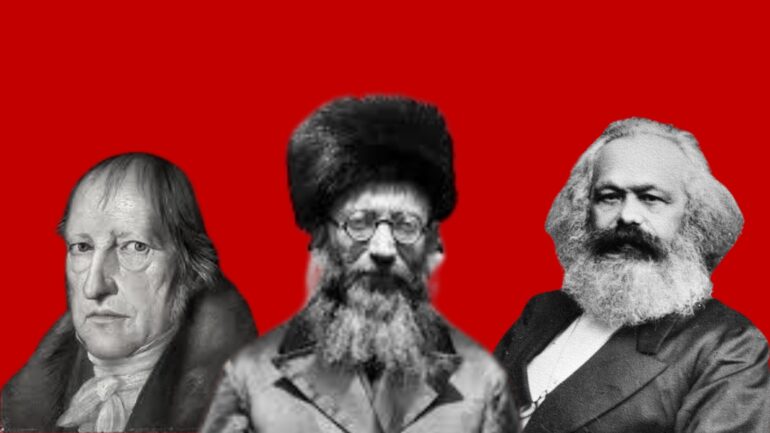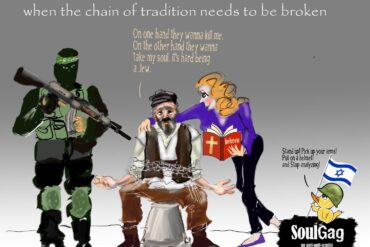Why do they hate us?
In Parshat Balak, we receive a unique look into the deep fear and hatred of Am Yisrael prevalent within other nations. King Balak of Moav, together with his allies, enlisted the Aramean prophet Bilaam to curse Israel as we encamped on the border of Moav.
The Moabite fear and hatred, their reliance on a prophet in light of Israel’s military victories over Siḥon and Og, and Bilaam’s ultimate inability to curse the nation provide an interesting window into understanding the history of Jew hatred.
For millennia, Jews have been uniquely targeted for ostracization, annihilation, and assimilation by the nations of the world.
Countless thinkers, Hebrew and Gentile alike, have approached the Jewish Question and produced a dizzying number of explanations. Their answers generally fall into two fundamental frameworks for understanding history: the Hegelian Idealist approach and the Marxist Material approach.
According to Georg Wilhelm Friedrich Hegel, the history of the world must be understood through the interplay of ideas, and the reflection of ideals in material reality. In contrast, Karl Marx understood history as an interplay of material conditions, determining the reality that shapes abstract ideals.
Rav Avraham Yitzḥak HaKohen Kook’s understanding of history, grounded in the Torah (and especially the Kabbala), might be interestingly characterized as a synthesis of the two.
Rav Kook agrees with Marx that in general, material conditions and interests of power and security are the defining factors that have shaped the development of ideology in world history. He posits, however, that Am Yisrael was created with the unique mission of being a national manifestation of the Divine Ideal in the material world, a far more Hegelian approach. Thus, to understand the hatred for the children of Israel, we must take both approaches into account.
First, the idealist approach, which more closely reflects our own understanding of Israel’s place in history. Since antiquity, our sages have taught that we are engaged in a “culture war” with the forces of Egypt (immutable materialism) and Edom (universalist uniformity). The history of Am Yisrael and of the entire world – which our sages understood as a recapitulation of the spiritual and material struggles of our forefathers – has been the story of our national struggle to manifest and reveal the Creator’s Oneness in the world, in contrast to ideologies that seek to obstruct the universal perception of HaShem’s unity.
Ancient Egypt, and by extension all ideologies that promote base materialism and a rejection of values beyond our physical world, represent the one extreme, a world devoid of holiness, which the children of Israel emerged onto the stage of history to combat during the Exodus.
On the opposite end of the spectrum, Edom (and by extension all absolutely universalizing tendencies) represents an attempt to erase the unique manifestations of kedusha in each part of Creation. The Hebrew mission is to balance between both extremes, between worshipping natural difference for its own sake and rejecting all difference for the sake of senseless uniformity.
But the materialist framework is incapable of grasping the idealist components of this mission. This is where we meet Balak. The inability of Moav to understand Israel’s Exodus from Egypt beyond a material framework – as a threat to their sovereignty and security – drives the two nations into conflict. This is despite the explicit intent of Am Yisrael to pass through the lands east of the Jordan peacefully on their way to inherit Eretz Yisrael.
From the materialist perspective, Israel – like every other nation – is interested not in manifesting ideals, but in pursuing material needs. That makes Jewish nationhood threatening. Jews, operating to advance the material interests of the Jewish people at the expense of the nations in which they lived, are understood as a threat to the world’s prosperity and security.
In antiquity, there was the fear that Jewish artisans and traders would exploit the plebeians and the patricians alike, underpaying the commoners for raw materials and overcharging the wealthy for finished products.
In the late medieval and early modern era, there was the fear that Jewish bankers and tax collectors would impoverish the peasants with exorbitant interest rates and undermine the nobility by greedily skimming off the top.
And today there is the fear that Jewish landlords and bureaucrats are mercilessly collecting from below while using loopholes and proximity to the authorities to beat out competition at the top.
Of course, religious, national, and cultural leaders present all sorts of ideological bases for responding to these fears. This is a classic example of how Marx sees material interests shaping ideology. But the material development of ideology can be traced further back to Parshat Balak. In order to respond to the perceived material threat, King Balak turned to Bilaam the prophet, a man of ideals, to challenge the Hebrews on the ideological plane.
Bilaam belongs to a small unique class of our historic antagonists – Amalek, Haman, Hitler (may their memories be erased) – who, while operating within the materialist paradigm, were aware that our mission is one of ideals – ideals that challenge the very foundations of their civilizations.
Bilaam understood that as long as Israel was operating in the war for ideals, the power to bless or curse would lie with HaShem alone. But even with this unique clarity, his blessings or curses couldn’t transcend the material – he saw Israel’s separateness as a rejection of other nations, their vast numbers as comparable to dirt, and even their spiritual strength as inherently otherworldly, bearing fruits after death and detached from this reality. His greatest blessing, that endures in our daily morning tefillot, is about the beauty of our tents.
Even when the nations recognize Israel as unique in history, that uniqueness is bound by the constraints of the material world. As long as that framework persists, the nations will always operate out of a fear that the Jew is only looking out for himself.
This is where the influences of ancient Egypt and Edom have retained their base of strength, millennia after their first political manifestations collapsed. On one side, the scientific revolution’s insistence on empiricism blinds the world to the ideological plane on which we operate. In a world where one plus one must always equal two, all national interests become a zero sum game due to the law of the conservation of matter. And when the only rule in global politics is the survival of the fittest, humanity is unable to recognize the Divine hand in history, and even Israel becomes blinded to our own mission.
At the same time, the enlightenment’s insistence on the universal principles of “natural law” and “unalienable rights” for all have turned humanity against an appreciation for the material realities that distinguish HaShem’s creations in this world; the Jew – who insists on his separateness, his chosenness, his prophetic law that was not given to all human beings – must be universalized. Not for the sake of the universal ideal, but because Israel’s separateness represents a material threat to the rest of humanity in its quest for unification.
So what are we to do? Are we doomed to fight an endless uphill battle with an opponent who will never truly understand the enemy he is fighting?
The answer lies in Rav Kook’s approach to history. Israel must fully live the Divine Ideal, the fullness of Torah in all its complexities, in this material world. We need a Jewish state, but not to compete in international politics. We need a Jewish economy, but not to compete in international markets. We need a Jewish culture, but not to compete on the international radio waves. We need a national revival, not for our own narrow material interests, but to illuminate the rest of humanity and all of Creation with Divine light.
Universalism manifested through nature, materialism in the service of a Divine Ideal. Only once we recognize that this is our destiny and our mission will we truly free ourselves of the yoke of exile and of the Edomite fourth empire, and finally be able to move forward towards the next stage in our liberation struggle.





